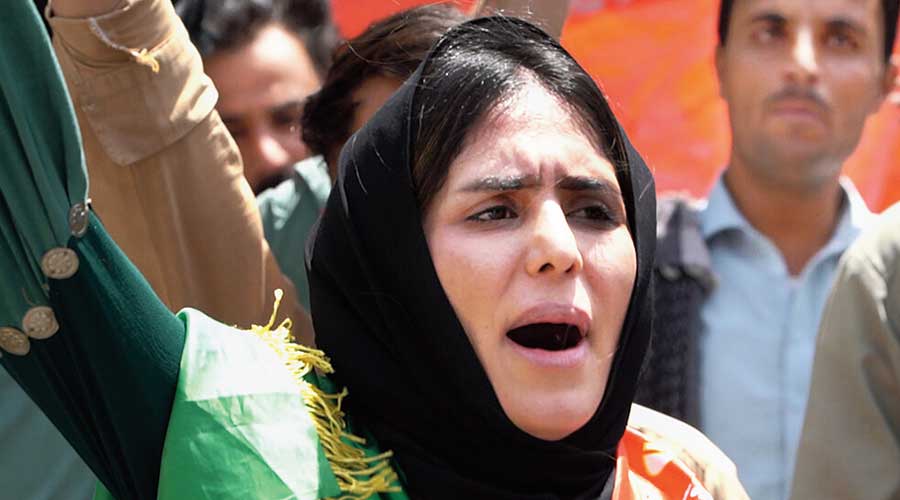A week ago when Gifty Sehrawat from Delhi University saw a video shot in Afghanistan, she gasped: “Oh my God! That’s my classmate!”
On the screen was Crystal Bayat, who, at 24, has emerged as the face of the peaceful resistance to the new Taliban regime in Afghanistan.
Bayat had cut her teeth in activism at Delhi University — a testimony to the vibrancy of Indian campuses that has fallen prey to vicious attacks after the Narendra Modi government came to power.
A human rights activist, entrepreneur and aspiring diplomat, Bayat had studied political science at the DU-affiliated Daulat Ram College (DRC) between 2016 and 2019, during which she had taken part in multiple movements although the causes did not have a direct bearing on her.
Bayat was filmed by The New York Times leading a march with the Afghan national flag on August 19, the country’s Independence Day. Taliban militants prevented their attempt to fly the flag atop a hill with threats, assault and finally gunfire that injured at least three people, she told The Telegraph on Wednesday.
Currently at an undisclosed location outside Kabul, Bayat fondly remembered her time at DRC where friends encouraged her not to give up studies or her dreams even when the going got tough.
She told this newspaper over an Internet call: “My teachers supported me. My friends Deeksha Gulia and Kalpana Rawat showed me a new face of life. They were most helpful and gave me the strength to stay on to complete my studies in India even when I faced difficulties…. My friends continue to ask about me now.”
Bayat added: “I expect India to show friendship at this time of crisis. I don’t think they are helping very much right now. Refugees must be given good facilities and avenues for employment.”
Bayat said she had opportunities to move to India, the United Arab Emirates or Turkey, but chose to stay back in her country for now. “I want to resist this violence. I want to show that we women will not give up so easily the rights that we fought for.”
One of Bayat’s teachers at DRC, Deepak Bhaskar, said she often attended Delhi University Teachers’ Association protests to show solidarity, as well as agitations on campus.
“I once saw her at a demonstration of students from the Northeast near the Vivekananda statue (on the DU campus). I asked what she was doing there, and she replied that she was standing with people fighting for a good cause. She chose her causes, and did not go to every protest,” Bhaskar said.
He said some of the things Bayat had said stuck with him. “People can realise their goals when there is order in society. Human beings are not trained to be in chaos rather than order. Therefore, we need order, not chaos,” Bhaskar recalled Bayat as telling him as a student.
Bayat had gifted Bhaskar a yellow hand-woven Afghan stole.
DRC, a women’s college, attracts several Afghan students. The political science class has at least two students from that country every year. Bayat was on a scholarship from the Indian Council for Cultural Relations — the route of choice to India for most Afghan students.
“She spoke little, but was vocal when something happened and would participate as well as organise, like she did during the protests against the sexual harassment of a student by a bank employee (in 2017). The political science department is a vibrant space and she is trying to practise what she learnt here,” Bhaskar said.
After returning to Afghanistan in 2020, Bayat started a number of initiatives like the Justice and Equality Trend — a civil rights group — the Crystal Charity Foundation and a logistics firm.
She also began studying to join diplomatic service and obtained a master’s degree from an Iranian university.
“The last 19 years, I am studying to achieve my goals, but today unfortunately all my dreams have died,” Bayat told the Times, choking.
Bayat’s faith in democracy was strengthened by early victories in her career as an activist.
She was part of a movement for the recognition of the Bayat ethnic minority of Turkic Shias by the previous Afghan government last year.
Seeing her gynaecologist mother and bureaucrat father unable to work after the Taliban takeover, Bayat organised friends and associates of the Justice and Equality Trend for a march to the Wazi Akbar Khan hill, which overlooks the capital Kabul, to hoist the national flag on August 19.
“The Talib flag is illegal, so I asked many to come with me to hoist our national flag on Independence Day. My family was supportive but neighbours said it was wrong and unsafe for me to take a stand against terrorists…. When we were shouting ‘Zindabad Afghanistan’, the Talib opened fire. They argued with me, saying I was a woman and I should be indoors, and that we had just 20 days of freedom. They beat up the men with us,” she said.
Bayat added: “I want to tell the world that ‘look, the Taliban haven’t changed. They don’t want us women in politics or the economy. They don’t allow the arts. They have declared music as haram. They will be resisted’.”
Bayat’s classmate Sehrawat told this newspaper: “We have sat together in protest in college.… After things went bad in Afghanistan, I knew she wanted to leave as she also knew it was risky. But when I saw her in a video, I was shocked. I said, ‘Oh my God! That’s my classmate.’ We are proud of her.”










